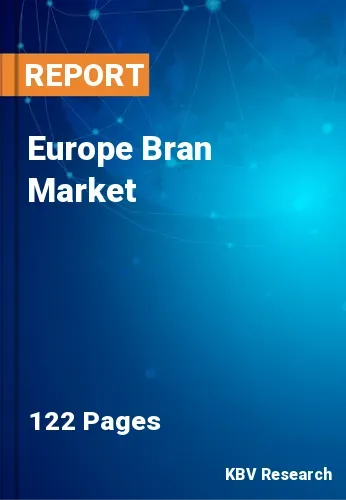The Europe Bran Market would witness market growth of 7.6% CAGR during the forecast period (2023-2030).
Expanding consumer awareness of healthier diets and active lifestyles will increase food demand and drive market expansion in the coming years. As cases of diabetes, obesity, and heart disease increase, consumers are increasingly choosing foods that include dietary fiber because of their added health advantages. This will probably increase demand for corn bran as well. The nutritional value of corn bran, which is driving its demand, is the main factor contributing to the market's expansion. The demand for wheat bran in the processed food industry has increased dramatically due to its beneficial effects on gut health. In the upcoming year, the market is expected to rise due to the rising use of bran as a fiber and protein source in livestock feeding.
Consumers have become more concerned with gut health in recent years due to a greater understanding of its beneficial effects on overall health. Cardiovascular diseases affect a significant portion of the region’s population. Prebiotic food demand has considerably risen because fiber enhances gut health and lowers the risk of lifestyle-related health disorders. Leading companies have created creative prebiotic snacks and processed foods in response to consumer needs for high-fiber functional foods.
In the cosmetics sector, wheat bran is used to create masks, sunscreen lotions, and anti-aging creams to treat skin irregularities. Animals' milk and meat production is increased because of wheat bran. Wheat bran is helpful in the pharmaceutical sector as well. Dietary fiber, which is plentiful in wheat bran, aids in improving bowel health and preventing diseases like colon cancer. Wheat bran contains bioactive compounds such phenolic acids, arabinoxylans, alkylresorcinol, and phytosterols in addition to being rich in minerals and vitamins. These substances aid in the prevention of cardiovascular disease.
The number of vegans in Germany has surpassed 1.5 million. Germany has the greatest rate of vegetarianism among its European neighbors. Vegans, vegetarians, and flexitarians drive food trends, and in 2022, the demand for plant-based foods is expected to increase at an astounding rate. Young Germans are particularly aware of the environmental impacts of meat eating, and Germans as a whole are generally fairly eco-conscious. In the next decade, it is anticipated that the demand for plant-based foods will continue to increase. The market is predicted to expand because of the increase in plant-based foods in the European region.
The Germany market dominated the Europe Bran Market by Country in 2022, and would continue to be a dominant market till 2030; thereby, achieving a market value of $4,525.3 million by 2030. The UK market is exhibiting a CAGR of 6.7% during (2023 - 2030). Additionally, The France market would experience a CAGR of 8.4% during (2023 - 2030).
Based on Application, the market is segmented into Food (Bakery Goods, Oil, Breakfast Cereals, Pasta & Noodles, and Others), Animal Feed, Health & Wellness, and Others. Based on Distribution Channel, the market is segmented into B2B, and B2C. Based on Source, the market is segmented into Wheat, Rice, Corn, Barley, and Others. Based on countries, the market is segmented into Germany, UK, France, Russia, Spain, Italy, and Rest of Europe.
Free Valuable Insights: The Worldwide Bran Market is Projected to reach USD 122.9 Billion by 2030, at a CAGR of 8%
The market research report covers the analysis of key stake holders of the market. Key companies profiled in the report include GoodMills Group GmbH (Leipnik-Lundenburger), Riceland Foods, Inc., Wilmar International Limited, Archer Daniels Midland Company, Hindustan Animal Feeds, Astra Alliance, Siemer Milling Company, Didion Inc., Grain Millers, Inc. and Grain Processing Corporation (Kent Corporation).
By Application
By Distribution Channel
By Source
By Country

Our team of dedicated experts can provide you with attractive expansion opportunities for your business.

